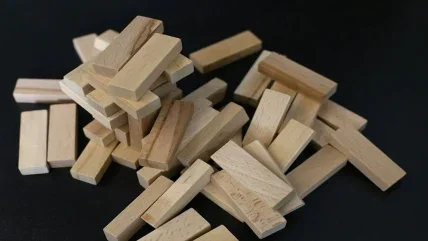
Brazil’s laminate flooring producers have been having a difficult time in a difficult national economy.
Now, the manufacturers are fighting back with innovative designs and fitting systems. They are also making a concerted effort to choke off the flow of at least some foreign flooring products entering Brazil illegally. Prior to 2011, Brazil’s still-modest laminate flooring market showed promise, achieving annual growth levels of 15-20%, and several leading local producers invested to expand their product range and capacity.
Last year, as Brazil finally succumbed to the effects of the world recession, its laminate flooring market only managed to expand by 2%. With analysts revising downwards their growth forecasts for GDP in 2013 to just 2.3%, the Brazilian producers are unlikely to see their market rise above the 2012 figure, according to ABIPLAR, the laminate flooring industry association.
The association reported that wood based flooring imports last year, chiefly from China and Europe, absorbed what small growth the Brazilian market did achieve.
The wider floor covering sector in Brazil, in common with other tropical countries worldwide, is dominated by cool-touch ceramic tile products. In 2010, association figures showed that laminate flooring had just 2% of the flooring market, while ceramic and porcelain tiles combined held a 90% share.
Today, some 400 million m2 of floor tiles are used annually, while wood laminate products represent a mere pin prick in the market, with around 12 million m2 per year. "Another important factor to be considered is that huge imports of ceramic tiles at very low prices do compete with laminate flooring," explained ABIPLAR’s executive secretary Carlos Mariotti. However, it is the invasion of foreign laminate flooring products that most concerns ABIPLAR and its member companies, eucalyptus based panel groups Duratex and Eucatex, both of São Paulo.
According to association statistics, in 2012 laminate flooring imports accounted for 16.5% of the total sold in Brazil. It estimates that this year, imported products will represent in the region of 14% of a total of around 14.9 million m2.
During 2013, the association said it was determined to reverse the incredible import situation by taking renewed action to combat illegal commercial practices among importers. Recently, ABIPLAR was involved in a case where a 30-tonne shipment of illegal laminate flooring from China was seized by Brazilian customs authority officials after it was discovered that the importers were using incorrect tariff figures.
The Chinese flooring was also found not to have complied with the technical standards required for sale in the Brazilian market, the association recalled. As a result, the entire consignment was confiscated and destroyed. To protect the environment, ABIPLAR
arranged for the material to be taken to the Eucatex group’s wood recycling plant at Salto, São Paulo state. There it was turned into biomass for power generation to be used by the Brazilian panel manufacturer.
In the past two years, both Eucatex and Duratex have invested in projects to double their laminate flooring production capacity in a display of confidence in the future growth of the domestic market.
In May 2011, Duratex launched a new Homag flooring line at its Agudos panel mill, taking its overall site capacity to 12 million m2/year. The group, which had run a five million m2/year line there previously, said the new unit was faster and offered greater precision, allowing the company to introduce a range of new products.
The new Agudos line, producing the group’s Durafloor laminate range, was set to reach full production capacity during 2013. Duratex planned to upgrade its original flooring line in due course.
Despite a slowdown in investment during 2012, Eucatex invested US$7.5m to install a second line at its Botucatu board plant. Its project also doubled the production to 12 million m2/year at the end of last year.
Earlier in 2012, Eucatex admitted its laminate flooring business had suffered a slowdown in sales, despite a fall in imports. The group blamed this on a national competitor, the Chilean-owned Arauco do Brasil, which announced an alliance with the established Belgian flooring supplier Unilin. In 2013, Eucatex has reported an improved business situation for flooring. "Our volume increased almost 30% compared to last year.
Our new [flooring] capacity came at a good time, otherwise we would not have been able to supply the market until the end of this year," Eucatex’s executive vice president José Antonio Goulart de Carvalho told WBPI. Laminate flooring exports from Brazil remain extremely small, largely because of the high port costs, high taxes, corruption and red tape – the so-called ‘Custo Brasil’ (‘Brazil Cost’). In addition, national exporters cannot compete with the Chinese flooring products which are being sold all over Latin America, explained the ABIPLAR executive secretary.
Despite the battle with imports, Brazil’s flooring producers are sticking to the challenge of expanding the domestic market. ABIPLAR is playing a role in stimulating new growth through workshops and seminars with architects, engineers, interior designers and construction companies. But it is the member producers that are leading the way in promoting the spread of laminate flooring.
Duratex recently celebrated 15 years of producing laminate flooring. Today the Durafloor brand is a complete system, with a range of nine product lines, as well as a full line of finishing and installation accessories.
The Arauco-Unilin deal has seen high density fibreboard (HDF) produced by Arauco used as a substrate for both its own ‘Floorest’ brand and Unilin’s ‘Quick-Step’ flooring. Unilin has also been contributing expertise in floor coating and surface protection technology. The joint venture has invested in production improvements at Arauco’s panel plant in Piên, where it had a 250,000m2/year flooring line, as well as in marketing the products.
Today, the trend nationally is for companies to come up with more sophisticated finishes and newer, licensed, floor locking systems.






